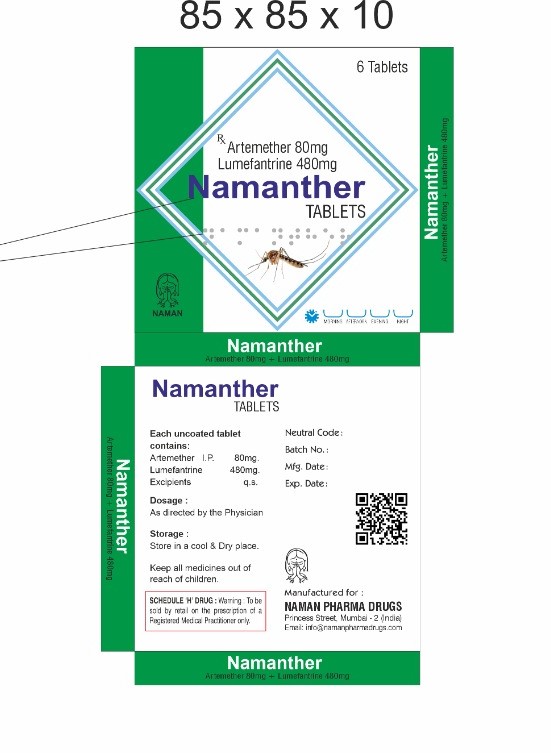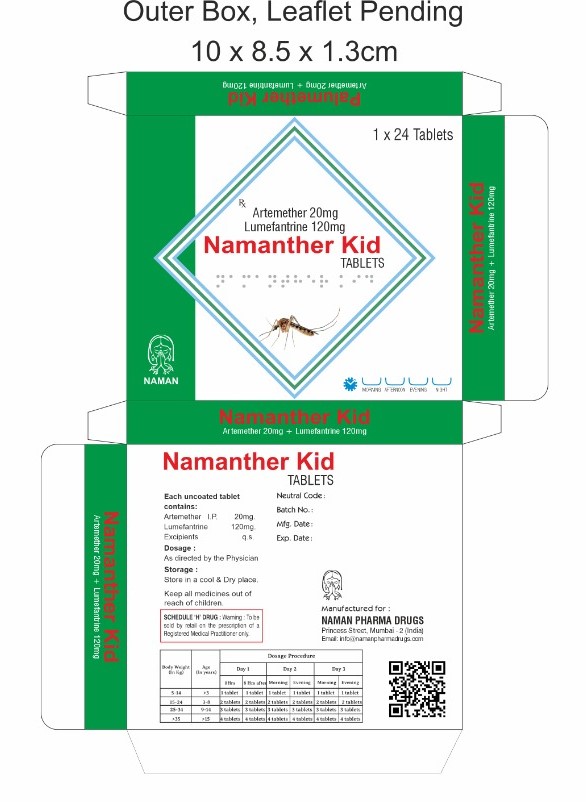Namanther Tablets
Namanther Kid Tablets


Artemether 80 mg
Lumefantrine 480 mg
Artemether 20 mg
Lumefantrine 120 mg
Namanther Artemether 80 mg and Lumefantrine 480 mg tablets are commonly used together as a combination medication to treat uncomplicated malaria caused by certain types of Plasmodium parasites, primarily Plasmodium falciparum and Plasmodium vivax.
Indications:
1. Malaria Treatment: Artemether and Lumefantrine combination tablets are primarily used to treat uncomplicated malaria in adults and children.
Dosage:
– The typical adult dosage of Artemether 80 mg and Lumefantrine 480 mg tablets is usually administered as a series of doses over three days. The specific dosing regimen may vary based on local treatment guidelines and the severity of the infection.
– For example, one common dosing regimen is as follows:
– Day 1: Four tablets as the initial dose
– Day 2: Four tablets in the morning and four tablets in the evening
– Day 3: Four tablets in the morning and four tablets in the evening
Precautions and Considerations:
– These tablets should be taken with food or milk to enhance absorption and reduce the risk of stomach upset.
– The medication should be taken as prescribed and for the full duration of treatment to ensure the complete eradication of the malaria parasites.
– If vomiting occurs within one hour of taking a dose, another full dose should be taken.
Side Effects:
Common side effects of Artemether and Lumefantrine tablets may include nausea, vomiting, diarrhea, headache, dizziness, and abdominal pain. These side effects are usually mild and temporary.
Contraindications:
– Individuals with a known allergy to Artemether, Lumefantrine, or any of the tablet’s components should not take this medication.
– It may not be suitable for individuals with certain medical conditions or those taking specific medications, so it’s important to inform your healthcare provider of your medical history and current medications before starting treatment.
Pregnancy and Breastfeeding:
– The use of Artemether and Lumefantrine during pregnancy should be carefully considered, and its use should be determined by a healthcare provider based on the risk-benefit assessment.
– It’s essential to consult with a healthcare professional before using this medication if you are pregnant or breastfeeding.
Please note that malaria is a serious and potentially life-threatening disease, and the treatment should be administered under the guidance of a healthcare provider. The information provided here is a general overview, and the specific dosage and treatment plan should be determined by a healthcare professional based on individual circumstances and local guidelines. If you suspect you have malaria or have been prescribed this medication, please consult with a healthcare provider for the most accurate and up-to-date information.
Namanther Artemether and Lumefantrine are medications used in combination to treat uncomplicated malaria in children and adults. These two drugs are often co-formulated in a single tablet for ease of administration.
Namanther Artemether 20 mg and Lumefantrine 120 mg tablets for kids are typically used in the treatment of malaria in pediatric patients. Here’s some important information about these medications:
1.Indications: These tablets are used to treat uncomplicated malaria caused by Plasmodium falciparum in children and adults. Malaria is a mosquito-borne disease, and this medication is effective against the malaria parasite.
2. Dosage: The dosage of Artemether and Lumefantrine tablets for children is typically based on the child’s weight. It is important to follow the dosing instructions provided by a healthcare provider or as specified on the medication packaging. The tablets are usually taken with food to enhance absorption.
3.Administration: These tablets are usually administered orally, and they are typically given as a once-daily or twice-daily regimen for several days, as directed by a healthcare provider.
4. Duration of Treatment: The duration of treatment can vary depending on factors such as the child’s age, weight, and the severity of the malaria infection. It’s essential to complete the full course of treatment even if the child starts feeling better before finishing the medication.
5. Precautions: Before giving these tablets to a child, inform the healthcare provider about any allergies, medical conditions, or medications the child may be taking. This information is important to ensure that the medication is safe and appropriate.
6.Side Effects: Common side effects of Artemether-Lumefantrine tablets may include nausea, vomiting, diarrhea, and headache. Serious side effects are rare but can occur. If a child experiences any severe or unusual symptoms, seek medical attention promptly.
7. Storage: Store the tablets according to the manufacturer’s instructions, typically at room temperature, away from moisture and direct sunlight. Follow proper storage guidelines to maintain the medication’s effectiveness.
8. Safety: These tablets should only be used under the supervision of a healthcare provider. They are prescribed specifically to treat malaria and should not be used for any other purpose.
9. Adverse Reactions: While Artemether-Lumefantrine is generally safe and effective for the treatment of malaria, it’s essential to be aware of any potential drug interactions or contraindications that may apply to the child’s specific medical history.
Always consult with a healthcare professional for specific information about the use of Artemether-Lumefantrine or any other medication, especially when it comes to pediatric dosages, as they can vary based on the child’s age and weight. Proper diagnosis and treatment of malaria should always be carried out under the guidance of a healthcare provider.
